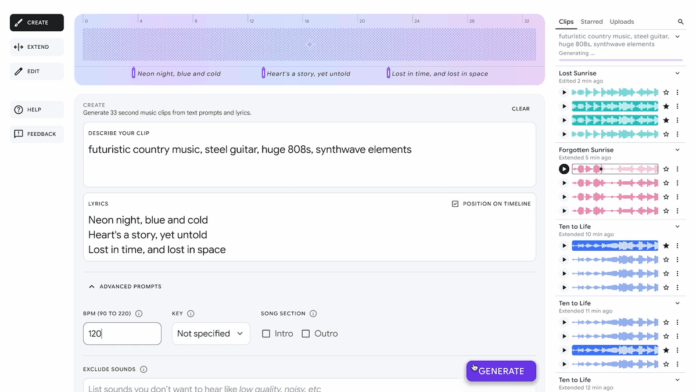- Google DeepMind enhanced and expanded access its Music AI Sandbox.
- Now, the Sandbox includes the Lyria 2 AI model and RealTime features for generating, extending, and editing music.
- Music is watermarked with SynthID.
Google DeepMind added some new and improved sounds in its Music AI Sandbox. The Sandbox offers the Lyria 2 AI Model and the Lyria RealTime AI Musical Production Tools.
Google’s Music AI Sandbox is a tool that can help you generate ideas, create soundscapes and perhaps even finish the half-written verse that you’ve avoided looking at for an entire year. The Sandbox was designed for professional musicians and producers. Access has been restricted since 2023. Google is now opening the platform up to a much wider audience in music production. This includes those who want to create soundtracks and games.
Lyria 2 AI is the rhythm section of the new Sandbox. The model can produce high-fidelity audio outputs with intricate and detailed compositions in any genre. This includes shoegaze, synthpop, or whatever weird lo-fi hybrid banjo-core you’re cooking up at your bedroom studio.
Lyria RealTime puts the AI’s creation into a virtual studio where you can jam. Lyria RealTime allows you to mix ambient house beats and classic funk on your keyboard. You can perform and tweak the sound as you go.
Virtual music studio
Sandbox offers three tools to produce the tunes. Create lets you describe in words the sound you want. The AI then creates music samples that you can use to jump-start your project. Upload your rough idea and let Extend come up with new ways to continue it in the same style.
Edit is the third feature, which, as its name suggests, reworks the music into a different style. You can ask your tune to be reimagined into a different genre or mood by experimenting with the digital control panel or text prompts. You could, for example, ask the AI to do something as simple as “Turn this into a ballad,” and something more complex, like “Make this sadder but still danceable,” or you could get really weird by asking it to “Score this EDM drop like it’s all just an oboe section.” . You can listen below to an example created by Isabella Kensington.
Music AI Sandbox Demo: Isabella Kensington – YouTube
AI singalong
All tracks generated by Lyria 2 or RealTime are watermarked with Google’s SynthID. The AI-generated tracks are easily identifiable, even if someone tried to pass them off for the next lost Frank Ocean Demo. It’s a smart decision in an industry that is already preparing for heated debates over what counts as “real” and what doesn’t.
These questions are not just abstract discussions on how to define creative expression. They also determine the fate of a large amount of money. This is not the end of traditional songwriting, just as AI tools aren’t the end of text, images and videos. It’s not a magical source for the next chart-topping song. If AI is not used properly, it can make a half baked hum sound stale. As Sidecar Tommy shows below, many musical talents are aware of what AI can and cannot do.
Music AI Sandbox Demo Sidecar Tommy: YouTube
- Does AI harm music or is this just another step on the auto-tune timeline.
- For now, I’ll stick with music libraries.
- This AI-powered piano wants to teach players how to play.
Eric Hal Schwartz has been a freelance writer at TechRadar for more than 15 years. He has covered the intersection of technology and the world. He was the head writer of Voicebot.ai for five years and was at the forefront of reporting on large language models and generative AI. Since then, he has become an expert in the products of generative AI, including OpenAI’s ChatGPT and Anthropic’s Claude. He also knows Google Gemini and all other synthetic media tools. His experience spans print, digital and broadcast media as well as live events. He’s now continuing to tell stories that people want to hear and need to know about the rapidly changing AI space and the impact it has on their lives. Eric is based out of New York City.


